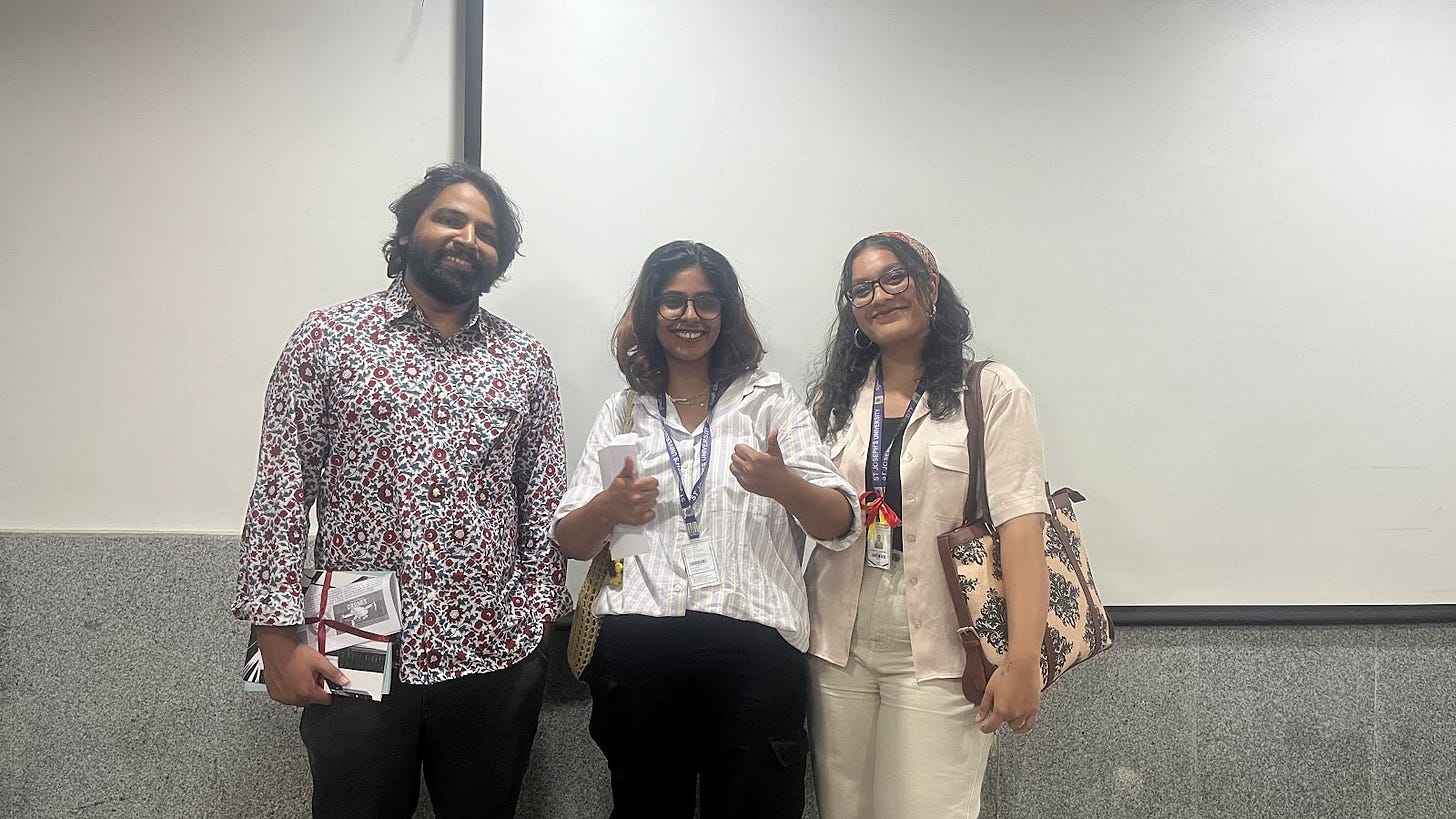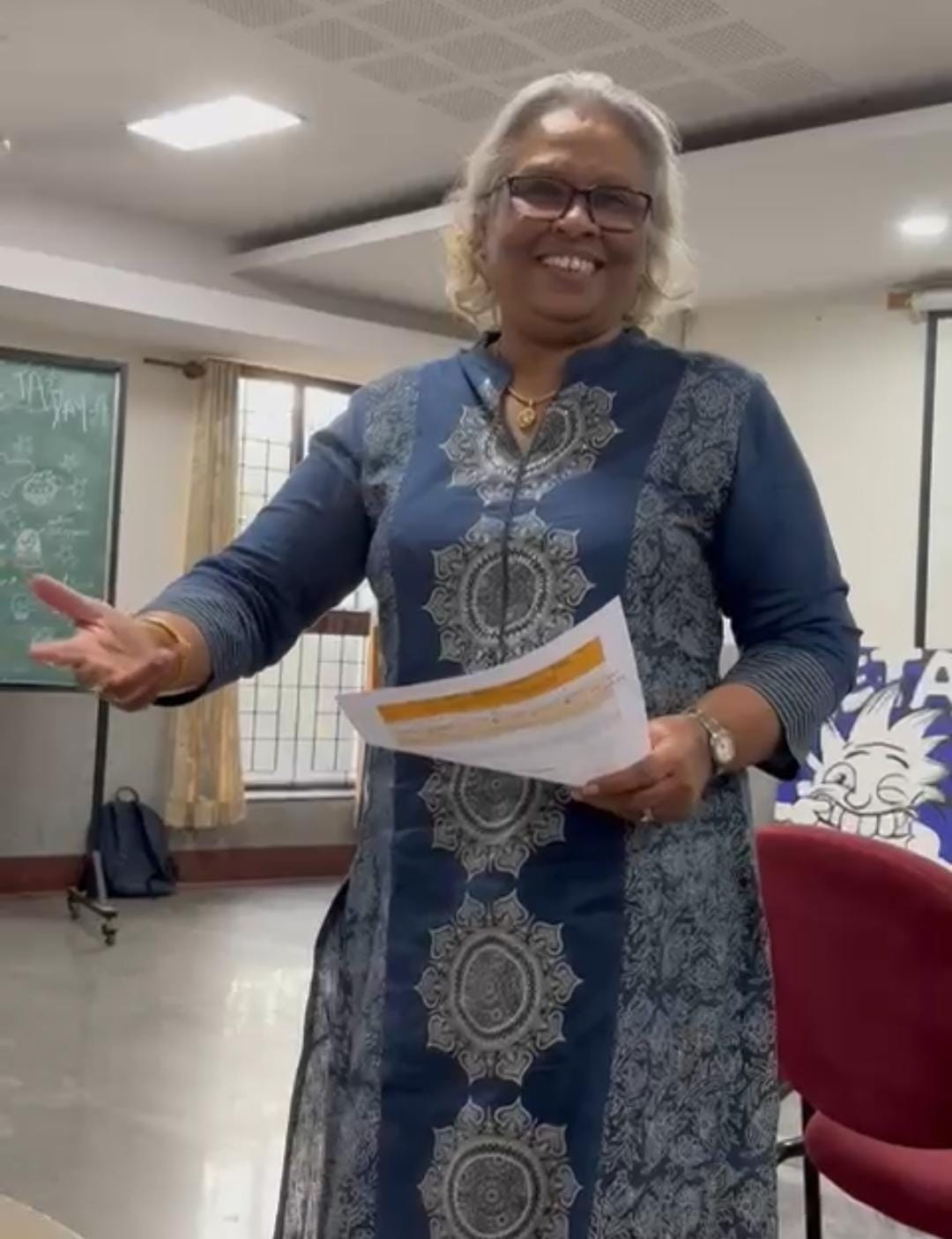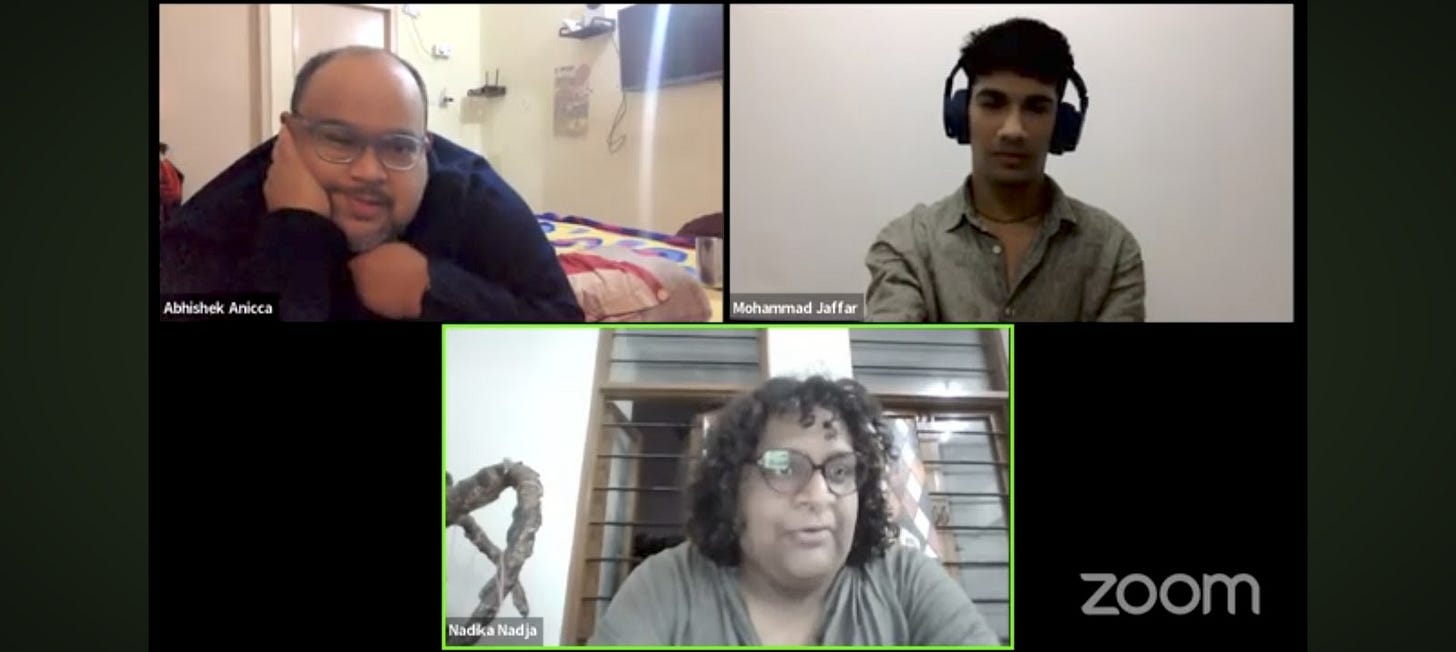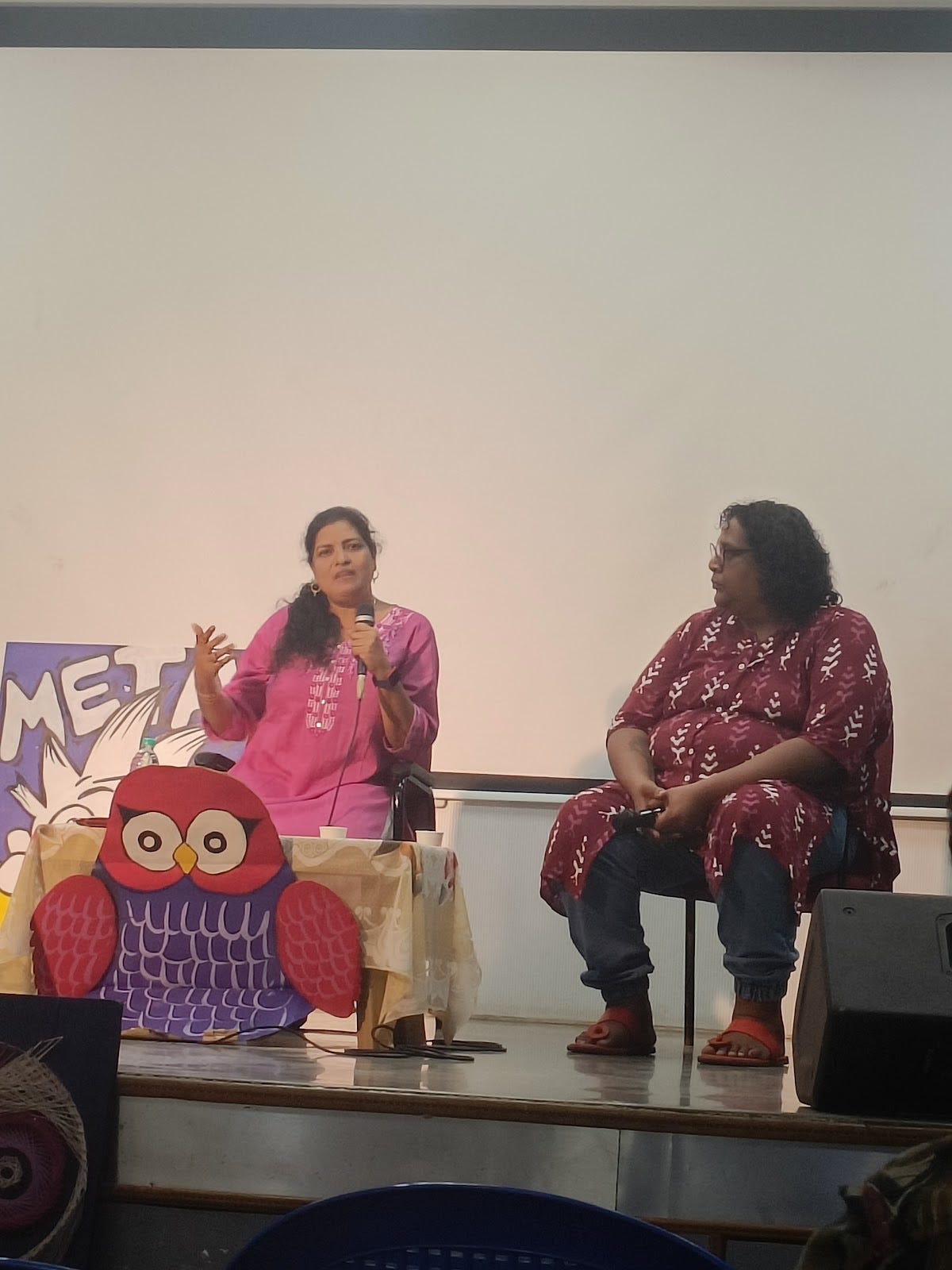ON FESTIVE MURMURS PT.2
Ways of an artist by Anurag Minus Verma
- Rithika Radhakrishnan (222JPY01)
A former engineering student turned filmmaker, Anurag Minus Verma. He was one of the guests who was invited to have a conversation for META 24’ by the English department of St. Joseph’s University, on 14th February at 5:00 pm. He was joined by Prof. Vijeta, and two students from the final year of JIP, Tanishk and Rose Mary.
The talk started with the audience viewing his films, a satire kick to mundane life. The Rajasthan wedding film explored a day in the life of a Rajasthani wedding and a narration from the perspective of the groom’s friends. The film captured the simplest thing of a wedding and people. His online avatar, Ronnie is a prime capitalist consumer poking fun at politics. Anurag dropped out of college due to differences of interest in career. He fondly loved the art of creation through media. The artist started his career in the lockdown period when he wanted to create something for the people.
“I always believed an artist could create art only through torture but I think it’s unnecessary.” he started off the conversation. He discussed the life of an artist and the process of creation. He argued that creating content with politics can be a controversial issue that can lead to cancellation but without it, art cannot be created. “Creating art doesn’t necessarily work with controversial ideas but your ideals and beliefs are the source of creativity. Instead of going miles to search for creativity like others, just keep digging through your feet of ideals and you will find your will,” he said regarding the fear of cancel culture and about the source of ideas raised by the audience.
The filmmaker and writer argued that filmmaking is his favourite medium of creation. He spoke of the benefits and obstacles of filmmaking. Rajasthan, his place of birth, had an impact on the location, content, and genre of his films. “ I am from a rural area of Rajasthan and I’m a Dalit, my films are going to be about it some way or other.” he reflected on how culture influences his filmmaking.
The conversation ended with pictures and personal questions from the audience with Anurag Minus Verma. The third day of META’ 24 has come to an end.
MASTERING ELOCUTION: TIPS FROM META 2024
"Elocution is your voice."- Dr. Sherly Bernard
- Humaira Hasan (222JPY11)
META 2024 at St. Joseph's University hosted The Fr. Hedwig Da Costa Memorial Shakespeare Elocution Contest, organized by the Literary Society of the Department of English. The event, held on the evening of February 15th at Loyola Hall, provided elocutionists with a valuable opportunity to hone their skills with the tips offered by Dr. Sherly Bernard, who served as the judge.
The performances spanned a spectrum of emotions. There were 13 participants among which Sana Kamal from Christ University and Rose and Nihal from SJU, the winners of the contest skillfully articulated the intended emotions of the monologues for the audience to discern including many others. The winners generously shared insightful tips from their journey.
Dr. Sherly Bernard, a member of the board at Lady Doak College Madurai, while addressing the elocutionists, elucidated the art of successfully delivering an excerpt in the form of elocution. She emphasized choosing the right piece that complements the elocutionists' delivery styles. Sana had performed the monologue of Queen Margaret from King Henry because as she puts it- "it is one of the lesser known monologues".
On asking her how she decided on this monologue and infused her own emotions into it, she spoke about how the excerpt was expectedly very regal and not expressive being a Queen's dialogue. "I am a pretty expressive person so focusing on certain parts of the monologue like flaunting the victory was what I tried to make more expressive and appealing to the audience rather than sticking to the more subdued expressions of Queen Margaret over the years,"
Rose from St. Joseph's University, the second runner-up made Iago's monologue from Othello to be her choice. Iago's utter contempt for Othello was packed with masculine rage. On asking Rose how she translated this emotion to infuse in her performance, she replied," Now, I couldn't really express masculine rage. So, for me, it was easier to change it into feminine rage. Thus, I took Ursula from Little Mermaid as my inspiration."
"If you take out the element of the narrative of dialogue then you have completely lost the pleasure of Shakespeare," Dr. Bernard addressed the room. She then courteously singled out the devastatingly despondent monologue of Ophelia performed by one of the elocutionists. "It is not a speech, it is a conversation," Dr. Bernard graciously mentioned how the aforementioned tragic monologue was not meant to be delivered with a smile.
Dr. Bernard expressed her elation at the fact that the hall was filled with people interested in a Shakespeare contest. "Every time you have these competitions, Shakespeare is resurrected again," she said. The event was concluded by congratulating all the prize winners but as Abhilasha in the audience said, “The 40 minutes seemed to just fly by in the room."
Abhishek Anicca Navigates Diversity in Literature
- Malvheeka Raj (222JPY06)
Day 3 of St. Joseph's University’s Literary Fest ‘META’ ended with a zoom panel with Abhishek Anicca. Abhishek Anicca is a renowned writer and poet whose memoir ‘The Grammar of My Body’ was released in December 2023. Anicca, someone who identifies proudly as a person with disabilities and chronic illness, graced the virtual stage alongside Prof. Nadika and Mohammad Jaffar, a 3rd-year communicative English student from St. Joseph's University on 15th February.
The event commenced with Mohammad sharing his personal encounters with society’s perceptions of his disability, drawing parallels with Anicca's writing in his memoir. As the discussion unfolded, Anicca delved deep into his own narratives, shedding light on the intersection between disability, race, gender, sexuality, and class.
A topic that Anicca kept coming back to was the necessity of embracing diversity and helping marginalized voices to foster true progress. They emphasized that inclusivity does not mean ignoring one's disability but rather creating spaces where an individual's diversity can be acknowledged and heard.
The discussion came to an end with Anicca reading out a chapter from his memoir. Anicca picked the chapter titled ‘The Invisible Act of Being’. Describing it as his favorite chapter, Anicca explained that it should resonate deeply with those who often feel like becoming invisible in the midst of the chaos of their busy lives. Though the context he wrote it in was very different, I found myself constantly nodding my head as he read. This was brought to us by Prof. Nadika as well when she opened up about her struggle and how relatable the chapter was for her.
For many attendees, including myself, these conversations provided great insight into a world often hidden from view. Through the conversations that had just taken place, I came to realize that what I had previously perceived as 'representation' was simply a shallow attempt to tick boxes rather than a genuine effort to make voices and experiences heard.
A conversation with Jayant Kaikini and Tejaswini Niranjana
- Antony Manakil (222JPY16)
Bustling students and staff adorn the insides of DeNobli Hall, with more than a few still scurrying near its doors like little mice. I seat myself at the front-left portion of the hall, where a whiteboard reads “In conversation with Tejaswini Niranjana, Jayant Kaikini, Prof. Nikitha Thomas & Divyashree Adarante”.
Tejaswini Niranjana and Jayant Kaikini are award-winning veteran collaborators. The translator-writer duo are at META, a literary fest at St Joseph’s University where they’ll talk about their latest book, and the intricacies of writing and translation. Kaikini’s voice booms and thuds over a black speaker in a corner of the room as he recounts how his stories often don’t have a happy or clear ending like many fictional books do. Kaikini goes on to say that his endings are employed differently because in his writing he wishes to portray spaces where there is a mixture of “little light and little dark”. “I can’t write a story which can be said in two words”, he says emphasizing instead on a story’s process of transformation. Later, Kaikini says “Writing is a mode of thought”. Quoting his mentor and late author Yashwant Chittal, he goes on to say “I don’t write what I know, but I write to know” thus evoking the process of writing as a mode of thought. And in between his literary wisdom, Kaikini throws in the odd joke or so invoking no dearth of chuckles. Most of his speech is breezy and often leave the audience smiling, to which I am not an exception.
At one point, one of the moderators in the panel reads a sentence in Kannada from one of Kaikini’s stories and then counters it with it’s English translation. She asks if Kaikini is satisfied with the translation and notes a Kannada word which is translated simply to “money”, a translation that she deems inadequate. Kaikini and Niranjana smile. She is asked to give her understanding of the word's meaning in English which she finds difficult to do. To which, Niranjana responds while wearing a smile,” If you can’t say it, it can’t be said!”. Her response is met with laughter.
Mithun Number 2 and Other Short Stories, maps the short stories of migrants that have moved to Mumbai. Referencing Kaikini’s short stories, Niranjana says, “Many of my favorites are Bombay stories”. When asked about the process of translating for Mithun Number 2, the seasoned translator said, “We made a deliberate decision to bring in stories of transition, migration, and movement”. She explained that the process hadn’t changed drastically but rather the kind of stories and the way in which each of the stories had been selected incurred change. “I did the first cut of selection”, says Niranjana who then revealed that Kaikini had proposed further additions. “Jayant is very persistent and very stubborn”, says Niranjana whose dangling silver earrings seem to swing and nod in agreement with every word spoken. Kaikini smiles, mirroring the reactions of the rest of the flock . He doesn’t disagree.
And as the fading sunset that had permeated the curtains in patches of golden orange now leaves darkness in its wake, Kaikini and Niranjana sling their bag over their shoulder and make a beeline to the exit, impeded only by throngs of people waiting to talk to the pair.
A Montage of OTTaku, the Film and Series Quiz
- Sanjana Vinod (222JPY15)
At midnight of 17th February, when OTTaku, the films and TV series quiz was due to take place at 3 p.m., Pranava and I were on a Google Meet call, adjusting text on a PPT and clarifying roles and duties of the event. Pranava is the Convener of St Joseph’s University’s Quiz Club, while I am the Joint Secretary. Both of us, along with Dr. Arul Mani, Dean of the School of Languages and Literature, were the Quiz Masters for OTTaku.
OTTaku was part of META, the Josephite festival of literature, which the Literary Society organised. However, since this was a quiz event, it fell under the Quiz Club’s domain, so the tasks for the event–such as registrations, photography, documentation, and more–were split between the two groups.
Half an hour before OTTaku was scheduled to begin, a registration desk was set up in front of the venue. Within seconds, a queue formed before it, and within minutes, desks inside the venue were occupied.
A buzz of anticipation settles. College and open quizzers mingled amongst themselves, occasionally yelling out greetings across the room. Some quizzers tapped their feet nervously staring at the door, trying to summon their partners before the quiz started, while others ran around the room looking for partners to tackle the quiz with.
Loud cheers erupted when Pranava stood in front, the PPT an array of colours behind him, and started the quiz. For one of his questions, he shows a muted clip from The Bear and asks the quizzers to guess the legacy song of a pop-star being lip-synced. But before the song is played, a girl snatches the pen from her partner and scribbles down a name, grinning widely as those around her squint their eyes to read lips. The lighting up and frowning faces of people clue me in on whether they got it or not.
I’m greeted by claps when it's my turn to present my questions. My heart races as I shout out each question so everyone can hear. I give a few hints to help narrow their guesses, and each time I’m interrupted by the “Ayyyy,”s of those who already know the answer. I’m most proud of my last question, where I framed details of the live-action series release of Avatar: The Last Airbender to resemble the opening monologue of the animated series, and I’m overjoyed when I see quizzers fist bumping the air as I read it aloud.
Dr. Arul Mani’s set follows mine, and I photograph reactions: Accusatory fingers pointing at the PPT. Whispers between partners becoming heated. One man covers his face with his hands and stays like that for the remainder of the quiz.
Overall, just another day of quizzing.
I along with other office bearers from the associations collect everyone’s sheets and plop them down near the PPT. Armed with a pen, each of us corrects 6-7 answer papers, oscillating between leniency and ruthlessness regarding the quizzers’ answers as Pranava announces them.
He and I switch places once he’s done. I stand in front of the laptop and show the answer to my first question, soaking in the quizzer’s reactions: the surprised faces and cheers from those who got it correct, the slapping of foreheads and devastated closing of eyes from those who did not, and the, “I told you to put this down,” from those who guessed it but wrote down another answer.
Once all the answers are revealed, the quizzers head outside for refreshments while we double-check our corrections and sort out the winners. When everyone returns, Pranava calls out the top 5 teams who won to thundering applause, and who are given coupons for Bookworm.
After we congratulate and thank everyone for coming, the quizzers participating in the next quiz linger in the room, complimenting the Quiz Masters and each other for setting the questions and getting them right, respectively. Others spill out of the room, discussing answers, while the office bearers prepare for the next quiz with renewed energy.
The Bookends: A Library of Quizzers
- Sanjana Vinod (222JPY15)
Photo Credit: Rithikha
Each year, one can see hoards of book enthusiasts gather together for a special event to test their knowledge on all things book-ish. I am referring to, of course, Bookends–a quiz hosted by the Quiz Club of St Joseph University in collaboration with the Literary Society for the Josephite literary festival META. Sponsored by Bookworm, an independent bookstore in Church Street, this quiz summoned a plethora of teams at 4 p.m. on 17th February.
Shruthi and Karthik, both Joint Secretaries of the Quiz Club, had set all the questions for the preliminary, written round. There were questions ranging from a nurse who saved a life because the symptoms matched what she read in a mystery novel to guessing the name of a bestselling novel, originally a Star Wars fanfiction.
For each question, there were always some participants who seemed pleased as they wrote their answer, some who grimaced knowing the guess they were noting down was wrong but having no other answer, some who were on the verge of breaking their partnership as they argued over which answer to write, some who’ve just given up, and some who’ve written a guess and are praying for the Quizzing gods’ favour.
It was a tight competition, with just a point or so difference between the top 8 teams who qualified for the finals, only one of which was a college team and the remaining, open.
Four rounds constituted the finals. A written round where participants had to recognise books, authors and events based on an excerpt run by Dr. Arul Mani, two pounce-and-bounce rounds set by Prof. Cynthia and Prof. Nikitha, and finally, another written round by Dr. Arul Mani where participants had to identify famous literary people and their connections with each other.
Despite it being a competition, merriment and enjoyment radiated from the participants. The spirit of quizzing and sportsmanship pulsed in the cheers and claps that went up each time someone answered correctly and the patience and encouragement from other participants when someone hesitated in guessing.
Shruthi, one of the Quiz Masters for the prelims, was overwhelmed in delight by the quiz and the participants, saying, “It was insane setting for an Open Quiz for the first time, and seeing so many people enjoy the quiz was genuinely so awesome. It was such a heartfelt moment for me.”
Book vouchers for Bookworm were handed out to every finalist. The three winners, however, were:
I place: Keshav & Nishanth
II place: Avinash & Nagaratna
III place: Jaidev & Shenoy
Poetry as Protest: Sukirtharani's Verses Challenge Caste and Gender Norms, inspires change at META 2024
- Amritha N M (222JPY17)
The air is filled with anticipation at Xavier’s Hall in St. Joseph's University as the audience awaits the start of Caste, Gender, and Writing: A Conversation with Sukirtharani and Professor Nadika, an event part of META 2024. The event, held on 17th February, began at 6:30 pm and dived into the complex intersection of caste, gender, and their expression in writing.
The conversation between Sukirtharani and Professor Nadika was conducted entirely in pure Tamil. Before the conversation began, Sukirtharani, a popular name in contemporary Dalit and Tamil literature, received a special honour. Unable to travel to Canada to accept her poetry award in person, she was presented with the trophy on this occasion, adding a touch of warmth and recognition to the evening.
Sukirtharani is a teacher at the Government Girls High School in Ranipet. Her published collections of poems are known for their deep explorations of the female experience, particularly within the Dalit community. “My writing celebrates the female body while fiercely critiquing the oppressive caste system, reflecting the dual reality of my identity”, she proudly says.
She spoke of the complicated web connecting caste, gender, and societal injustices, highlighting how men dictate societal norms while expecting women to follow them. Her voice, a powerful instrument, resonated as she read verses from her poems, each line a roar against oppression. Lines like "What is god doing when a guy is raping a girl? Maybe he is raping a goddess too," echoed through the hall, leaving the audience introspective. Professor Nadika translated her speech into English, ensuring that the impact of her powerful message was not lost.
Her choice of role models is against societal expectations. While choosing her father as an inspiration challenged the norm of idolising mothers for domestic duties. Her funny remark about expecting a Valentine's Day gift despite being "intimidating" as a feminist, added humour to the heavy topic.
Sukirtharani's conversations extended to Sati and widowhood, exposing the hypocrisy behind these practices designed to "maintain balance" in society between men and women. She questioned why inter-caste marriages were discouraged and why remarriage for widows was disapproved when men faced no such limitations.
The impact of Sukirtharani's words wasn't just felt in the hall. Adhya, a friend of mine, who attended the event shared how a poem by Sukirtharani, brought to her English class, totally flipped her world upside down. "It made me question everything," she admitted, "Seriously, that poem was the reason I travelled 10 kilometres to be here today!”
The evening concluded with a Q&A session with the audience. When asked about reservations and writing for others, Sukirtharani's boldness glowed. She emphasised the importance of representation and using one's voice to uplift marginalised communities, leaving the audience with a powerful message: true change comes from challenging societal norms and writing stories that empower not just oneself, but also those silenced by societal norms.










